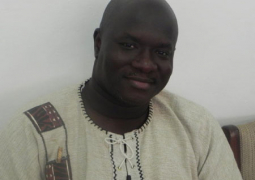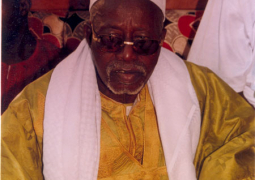This piece is an answer to the call from the desk of that erudite scholar, Nana Grey-Johnson to public spirited individuals as well as groups, moreso media fraternity. Trade unionists and politicians to rise and honour the late Edward Francis Small. This call came in the run-up to the celebration of 118 Birthday anniversary.
The day for the celebration is Thursday 29th January, 2009, an important day the calendar of Journalists, Trade Unionists and Politicians. And important in the annals of the history of the social as well as political evolution of this country.
The day should be observed and feted, being the birthday anniversary of that illustrious son of The Gambia who at the time of need, had emerged, as an underdog, giving so much by way of enlightenment, leadership and civic education to the people of this country during the dark colonial days.
Edward Francis Small did all these and several others about which we are going later to be specific, with very little means or practically nothing. He grappled with a colonial government, whilst his rivals wallowed in fortune, and did very little. That made him remembered and singled out as a defender of the people, a patriot, father of Journalism, father of Trade Unionism and founder of the first political party in The Gambia.
To have an insight into his work for The Gambia, we have first to reconstruct the social, economic and political landscape of the country and put in perspective. At the time of Small's birth 1891 and thereafter, including the time he began a new life around 1917/18 and closing the old that was dominated by religion and later facing intrigues which turned his life for a while upside down.
The time in question was when the colonial government was at
its height, known for its rigidity, suspicious of every son of the soil as a
threat. But not interested in ameliorating the living conditions of the people;
and not keen for a reform. At the time money was in the hands of only the
government and commercial firms, and very little money paid as wages to the
Gambian white and blue colour workers. This gave rise to the successful and
celebrated first workers strike mounted in
The social life of the country around that time was grim, facing poverty, hunger, disease and the attendant factors, bringing to mind the outbreak of endemic disease that wiped out half of the population of Bathurst and the part seriously affected is named 'HALF-DIE' a name up to this day in official books.
The social problem faced was compounded by the unbridled rivalry among Sons of the soil, Businessmen and wealth-to-do individuals, each making a bid to be nominated to have a seat in the country's legislative council.
At the time the masses did not matter. Their numerical strength and their Civic right did not count as they had no voting right. What was of importance was for an individual to show loyalty and allied oneself to the governor for he and he alone had the power to nominate an individual of his choice as member of the legislative council and representative of the people, whilst the people had no voice in the selection of a political representative and the composition of the legislature council. Money was being wrested from them in the name of Rate to pay wages to all white expatriate public service.
Amidst all these there was yearning for a leadership, an effective leadership that would recognize their sufferings and speak for them. For those at the time in the political arena were self-serving individuals, seeking contracts and nominations from the hand of the governor.
The wishes of the people were eventually met after an
incident that happened in the protectorate in the town of
A skeletal descriptive background reminds us that he was
born in
who felt offended, he claimed, by being disturbed from his sleep when the bell of the Methodist Mission chapel there tol1ed to herald the watchnight service on New Year's Eve.
The Divisional Commissioner at the McCarthy Island Division at the time, joined the fight, siding his European brother and causing the removal of Small from Balanngar. At hand-sight, it is believed that there was more in this than the mere chime of a tolling church bell. It is believed that the action of these two Europeans involved a case of conspiracy, an imperialist maneuver of getting rid of an unwanted person. For no one, especially a Christian with the love of his religion in his heart can feel offended let alone having cause to physically assault a church steward tolling a church bell, moreso, when the tolling was the dawning of a New Year. If a church bell is not tolled within a church premises and at that particular time, where else will it be tolled? Whilst everybody was jubilating, the trader and the commissioner apparently had a scheme to fix Edward Francis Small. He apparently left Balanngar a victim of conspiracy, feeling bitter and distrustful of colonial rule and its agents. The question is how many of the likes of Edward Small in The Gambia and elsewhere, had being subjected to such a conspiracy and treatment by colonial agents? Acts like this mischief had been rampant during colonial days. People framed, pilloried and victimized without any justification.
Acts like this and the political, social and the economic
situation all combined emboldened and hardened the likes of Edward Francis
Small and the lookalikes were in all parts of
All these look very new in the politics of the time and a very challenging and irritating to a colonial governor. Small as a full time public figure had no other agenda, all his time was devoted to politics and he was determined to wage a fulltime struggle against the powers that be. A strategy he crafted together was a platform of three planks, a political plank, a Trade Unionist plank and a journalist plank, all latel weapons each galvanizing, sharpening, and re-enforcing the others. Weapons he used intelligently enabling him to call a strike in 1929 which was so successful that the government and the Employers Association all ran after him begging him to call off the strike and offering him more than he had demanded.
The public support thus far acquired helped him in 1931 to
be the winner of the first direct election to the
Edward Small being winner of more bread and butter for the public in the strike of 1929, thus increased his fame and, he continued to be unequaled and called a patriot, a word in the past denoting respectability.
Notwithstanding the fact that newspapers were being published, according to records, as far back as 1871, twenty years before Small was born and thereafter, and although we have not being privileged to set our eyes on the 1871 newspaper and its name not available. Neither did we see any edition of the newspaper called 'Opinion' published in 1901 in Janjanbureh, we have been privileged to see copies of the newspaper called 'The Bathurst Intelligencer' published in 1898. We even made an extract from a page of that newspaper.
The publishers of those newspapers were born Gambians, but
none equalled Edward Small in the eyes of the public. To them and to succeeding
generation, he was a true nationalist, hero enjoying popularity and fame never
extinguished, alight at all times. His fame is exemplified and kept alive by
his admirers and supporters by the construction of an epitaph deep in the heart
of
Small's life ended just like many who came after him. Poor and a recluse. For their properties were auctioned and sold over their heads in paying debts incurred by their political supporters. This had been the lots of politicians of the 19th and 20th century. His legacy cannot be counted in terms of pounds, shillings, and pence. What Small left for the nation was a printing press called the 'Outlook'. This was inherited by the late M. B. Jones. The Labour Union was inherited by the late Babou Kebbeh and Dodou Ceesay, a political party, named, 'The Committee of Gentlemen'. A name borrowed by the late Idrissa Samba, Kebba Foon and M. B. Jones and used during their week-end night political broadcast talk. The last but not the least was the spirit of nationalism generated in every Gambian. Here, we don't have fascist, communist and we don't have anarchist. Neither do we have promoters of foreign ideologies. We have a lot to be grateful to Edward Francis Small and leaders that came after; for, without their steadfastness, their love for the country, this country would have sunk.
This country is fortunate, it has produced a nationalist, an icon an immortal whose Birthday Anniversary is worth celebrating. But our merriment and happiness is marred and the chill runs down our spines by the knowledge that the grave of Edward Francis Small is beginning to cave in where it has stood since January 1958 when our press hero was buried. Unfortunately time has worn the stone fabric, and funds are being sought payable to the GPU or to Nana Grey-Johnson to refurbish and preserve the grave for posterity with expert tilling.
Is there any Gambian of this generation to doubt that Edward Francis Small was first in all good deeds relating to public service?
Please help in funding works on his grave.
I will in my nest installment show how I too had problem in Balanngar with the Divisional Commissioner from 1951 to 1957.
Read Other Articles In Article (Archive)

Brufut Utd shatter Immigration to salvage lead in GFF 2nd tier
Apr 6, 2016, 10:36 AM



